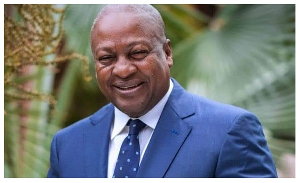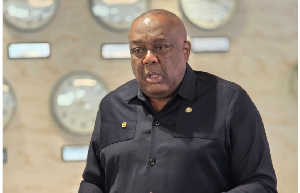The two major political parties have launched their manifestos last month to invite Ghanaians to have an understanding of what they planned doing to bring development when given the votes. The opposition NDC's manifesto was largely hailed as the best to bring the needed development Ghana so much need.
One major promise that is worthy of note is John Mahama's decision to persue full membership status for Ghana at the Islamic Development Bank (IDB). You find in page 5 of the Resetting Ghana Manifesto, 2024, the promise of "pursuing membership of the Islamic Development Bank to broaden opportunities for development financing."
The present membership of the Bank consists of 57 countries with its Headquarters in Jeddah, Saudi Arabia. Africa dominates the membership with 27 countries with Libya being the second largest shareholder just behind Saudi Arabia. It focuses on providing cheap finance including debt and emergency reliefs which Ghana cannot do without.
Aside finance, it seek to improve the capacities of member countries to be able to integrate Islamic banking principles into their financial architecture so that growth and development can be realized.
The intention of John Mahama is to ensure that there is development finance available to ensure that projects started do not get stalled. There is IDB Infrastructure Fund (IIF) which seeks long-term capital appreciation by making equity and equity-related investments in infrastructure projects and infrastructure related industries in IDB member countries and promotes the use of Islamic finance for such projects.
By the end of 2008, the Fund had committed a total amount of $785 million for 20 projects in 12 countries. The Fund’s investment has targeted primarily power, petrochemical, telecom, transport and mining sectors, which together had attracted about 95 percent of the Fund’s commitments, while the remaining 5 percent was allocated to the oil and gas sector. This is according to Jumad Awwal, (May 2009).
The sectors as mentioned above are critical for Ghana's development and we cannot wait to be part of a group who is deliberately determined at ensuring that countries develop through careful investments in these sectors. We are grappling with several challenges in our petroleum industry as there are no new oil fields coming up and the existing ones are not lifting enough oil to bring in the much needed revenue.
The Ghana oil and gas sector is exposed to the danger of collapse as Ghana's current leadership are at loggerheads with the oil drilling companies.
Galamsey has also become a threat to our survival as our cocoa industry and water bodies are endangered. We need technologies and manpower with technical expertise that will mine the minerals while at the same time ensuring that farms for cocoa production and waters bodies are adequately protected.
We must not also forget the inadequacies of our electricity sector. We are not able to pay the Independent Power Producers (IPPs) despite the introduction of the Energy Sector Levies Act (ESLA) for this purpose. Buying crude to power the thermal plants is also a big challenge.
In fact, financing the power sector in Ghana has been a very big headache for all Ghanaians and the consequence has been the erratic power supply, popularly referred to as dumsor, we normally face on daily basis.
The IDB will largely solve these issues as they are of great importance to it. The NDC's decision to join must be supported by all as its expertise and its money is badly needed to solve the challenges in the petroleum, minning and power sectors of our beloved country, Ghana. We also need the money to banish the common phrase, "abandoned projects."
Aside ensuring that funds are readily available for projects, there are several other benefits Ghanaians will enjoy for attaining full membership status of the IDB. The IDB Group is engaged in a wide range of specialized and integrated activities such as development assistance, resource mobilization, public and private sector financing, research and training in Islamic economics and banking, technical assistance for capacity building, scholarships for students, debt and emergency reliefs among others.
Committed to ensuring that there is rapid economic growth in member countries, IDB provides research and training in Islamic economics and banking, technical assistance for capacity building and scholarships for students in member countries and Muslim communities in non-member countries. This is aimed at ensuring human and particularly youth development as provided for in the Resetting Ghana Manifesto.
For instance, despite being a non member country, 23 needy but brilliant Muslim students benefitted from GH¢52,900.00 offered by the IDB scholarship scheme in Ghana at GH¢2,300.00 per student at various public universities in the country in 2016. By 2016, not less than 410 Ghanaian Muslim youth have benefitted from the local and external IDB Scholarships since it started effectively in 1986/87.
This has helped train people to man critical sectors of the economy to spur growth and development. We have benefited immensely without being a member. The quantum of benefit will be bigger if we attain full membership.
We must embrace this noble decision to promote development finance through the IDB. It will help ensure that we gain access to cheap finance to address the critical issues affecting various sectors of the economy without borrowing our way into a debt 'suicide.'
Opinions of Saturday, 7 September 2024
Columnist: Taluta Gbanha Mahama















